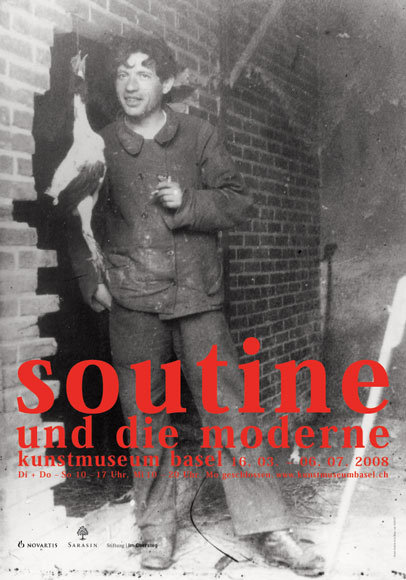Soutine and Modernism
dal 15/3/2008 al 5/7/2008
Segnalato da
15/3/2008
Soutine and Modernism
Kunstmuseum Basel, Basel
A survey

Curator: Nina Zimmer
In comparison to the much more renowned work of friends and contemporaries, such as Amedeo Modigliani or Marc Chagall, Chaïm Soutine's oeuvre still has an aura of discovery. In a representative survey at the Kunstmuseum Basel, a reassessment of Soutine's position as a painter will be presented within the framework of the complex fabric of movements that marks 20th-century art.
Born in Belarus in 1893, Soutine was confronted with unimaginable, in part religious opposition to his desire to become an artist. The decision to study art in Vilna showed great daring and courage. His path took him to Paris in 1913, the capital of the European avant-garde. Like many Jewish newcomers from Eastern Europe, Soutine initially found refuge in the sociotope of the studio residence, La Ruche, and later at the Cité Falguière, where he worked alongside such artists as Chagall, Modigliani and Jacques Lipchitz. Beyond this small circle, Soutine led a largely isolated life.
While artistic movements, some of them originating in Paris, made waves throughout Europe – Cubism, Futurism, Dada and Surrealism – Soutine remained relatively unimpressed by these ramifications of modernism and instead cultivated a distinctive, highly intense painting of his own, informed with an unprecedented degree of profound and palpable emotion. His pictures are freighted with the tension of collapsing perspective and hyperbolically distorted figuration, reinforced by a powerful, gestural brushstroke. The revolutionary potential inherent in this painting exerted an influence well into the 20th-century and was a seminal force in the work of artists like Francis Bacon or Willem de Kooning.
Paradoxically, Soutine is as much a visionary as he is a traditionalist: he was quite indifferent to one of the greatest achievements of modernism, the freedom of subject matter; he maintained an unwavering, lifelong devotion to the triad of still life, landscape and portrait. There is, in fact, not a single subject in Soutine’s art for which one could not find a 17th-century model. It almost seems as if art historically sanctioned genres afforded him the security that he needed in order to venture into uncharted territory as a painter.
The exhibition comprises some 60 works by Soutine, one point of departure of being the works of the Im Obersteg Collection on permanent loan to the Kunstmuseum Basel. Insightful juxtapositions with paintings by Soutine’s friends – Modigliani, Chagall, or Utrillo – and artists like Picasso, Braque or Munch highlight the artistic context of Soutine’s oeuvre. The selection clearly shows that Soutine was faced with the same artistic issues as his contemporaries, despite the fact that his extremely idiosyncratic trajectory eludes classification. The exhibition presents a new image of Soutine as the central figure at the intersection of the various artistic tendencies of his day.
The exhibition was kindly supported by:
Novartis International AG
Bank Sarasin & Cie AG
Stiftung Im Obersteg
Kunstmuseum Basel
St. Alban-Graben 8 - Basel



